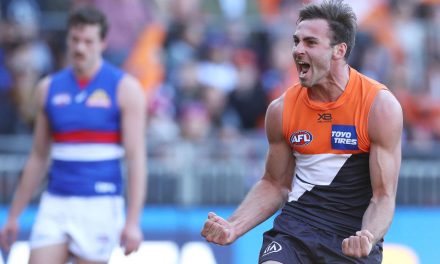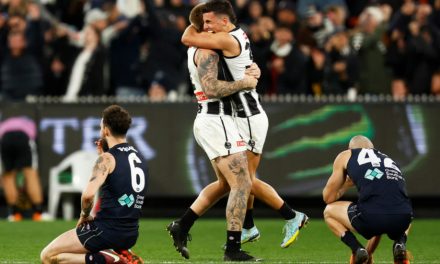Hawthorn celebrates the final siren in its 2015 grand final win over West Coast. Photo: AFL MEDIA
Adam Simpson finished up as West Coast coach this week with one premiership under his belt. Pondering his legacy over the past couple of days, I’ve wondered whether in a fairer AFL competition that might well be two.
At the risk of upsetting 2015 premier Hawthorn, which, after all, did belt the Eagles in the grand final and played two finals interstate, without the contractual obligation to play the premiership decider at the MCG it should have by rights been West Coast hosting Hawthorn at its Subiaco home where it had beaten the Hawks by five goals just three weeks earlier.
The Eagles had finished the regular season half-a-game ahead of the Hawks on the ladder, beat them in a qualifying final, but then had to play the grand final on their opponent’s home ground as “reward”. On a purely philosophical basis, no one can argue that that is fair.
Ditto Adelaide in 2017, which finished on top of the ladder, won both lead-up finals, but then had to play for a premiership on Richmond’s home deck. The Crows were awful that day on the ‘G’ and the Tigers superb, but it’s hard not to think we might have had a different game altogether if Adelaide had hosted, where it had beaten Richmond by 76 points in Round 6.
There’s plenty of other examples of these finals inequities, and they are surely the best possible demonstrations of how the AFL competition has never been conducted on a level playing field when it comes to the most important time of the season.
The AFL’s contract with the Victorian state government to play the grand final at the MCG until 2059 means that lopsidedness will continue, too. But the game can still do plenty more to ensure that the non-Victorian clubs get as fair a run at winning a flag as possible.
Frankly, even as a Victorian, I find it a little cringeworthy when clubs in my own state and their supporters spend so much time whingeing about interstate academies and cost of living allowances, when the fundamental injustice surrounding the biggest games of the year doesn’t even warrant a mention.
Sometimes it takes personal experience to open one’s eyes. Which is what moved Brisbane coach Chris Fagan to lobby the league after last year’s grand final with a document prepared along with the help of Sydney’s John Longmire and GWS coach Adam Kingsley about fairer treatment.
Fagan hadn’t had much to worry about in his previous capacity as Hawthorn football manager come grand final time. But as Brisbane coach, he’d become aware how seemingly small logistical details conspired against the travelling teams.
What can be done? The AFL is already talking about things like covering costs of non-Victorian grand final teams to spend the week in Melbourne, additional funding to allow families of players, coaches and staff to also travel, and more home and away MCG games for the non-Victorians.
PLEASE HELP US CONTINUE TO THRIVE BY BECOMING AN OFFICIAL FOOTYOLOGY PATRON. JUST CLICK THIS LINK.
The AFL, however, is already reportedly saying “no” to another proposal in the document, that of shifting the pre-finals bye to a pre-grand final bye, as was the case (because of Covid) when Optus Stadium in Perth hosted the 2021 grand final between Melbourne and Western Bulldogs.
I think that intransigence is a mistake, and I think shifting the bye to the week before the grand final is a very good idea, as does AFL Legend Leigh Matthews, who like Fagan, has experienced both sides of the “finals fairness” issue.

Adelaide captain Taylor Walker and his beaten teammates after the 2017 grand final against Richmond. Photo: AFL MEDIA
“With only seven days’ break currently, non-Victorian clubs in preliminary finals have to start planning before they’ve even qualified,” Matthews wrote in his newspaper column last week. “They’ve got all these logistical issues that they have to plan for just in case they win.”
An extra week applies equally to both teams, and allows the visitors some buffer time in the advent of unexpected situations, like, for example, Brisbane’s experience in 2001 when the Lions weren’t even sure until Wednesday of grand final week how they were getting to Melbourne after the collapse of Ansett airlines.
Shifting that week off also kills several “birds” with one stone. Like the very real danger of the mandatory 12-break under the concussion protocols costing a player a grand final spot for which he was fully recovered to take.
Not to mention the on-going issue of the pre-finals bye (yes, a big hobby horse of mine) which diminishes the advantage of the top four teams, often leaving them under-prepared, having played just one game in 27-odd days in they win their qualifying final.
Prior to the introduction of the pre-finals bye in 2016, 17 of the previous 18 preliminary finals (94 per cent) from 2007-15 were won by a team which had won its qualifying final, had a week off, then took on a more-fatigued opponent. In seven seasons of the pre-finals bye (2016-20 and 22-23) the record of qualifying final winners in the preliminary final is 8-6, that strike rate falling to just 57 per cent.
All that, mind you, just because Fremantle twice and North Melbourne once between 2013-15 rested a whole lot of players in the final home and away round, with their finals spots already assured.
It’s the sort of stuff which in other sports doesn’t raise an eyebrow, but in ours we for some reason compromised the integrity of our whole finals system just to crack a walnut with a sledgehammer.
The document prepared by the non-Victorian club coaches raises a score of issues which go against them come grand final time. A few are purely symbolic. But most go to the logistics of the most important game of the season and do make a very real difference.
If we were really fair dinkum about that, we’d be scrapping the MCG requirement and letting teams which had rightfully earned hosting rights do so. But if we’re not, we can surely do everything else possible to give them at least a reasonably fair go?
This article first appeared at ESPN.












Hi Rohan, this is spot on. Agree with all your points and strategies. Well done on acknowledging the unfairness to non-Vic clubs on GF day. It barely raises a mention but having watched my Swannies lose 2 x Grand Finals to lower ranked Victorian clubs in sad circumstances, it needs to talked about more. Great work as always
Also have a plan that could make a pre Grand Final Bye more acceptable to the AFL!
This year is the 25th that the AFL have used my Crawford Final 8 System.
I have other ideas as to how to make the uneven fixture fairer, how to minimise travel for non Victorian teams, how a form of relegation could work within the current draw, how to stop the McClelland Trophy being the joke it was last year and how to bring some relevance to every game throughout the entire season(might help stop any tanking).
I’d like to see these ideas discussed but the AFL refuse to acknowledge my existence and it seems like no journalists want to listen to my solutions.
How about when an ”interstate” and Victorian team meet in a preliminary final, the game is always played in the interstate club’s city, no matter which of them has earned the “right” for a home final?
I’ll leave it to you to think that one through before you reply expressing your horror at the very thought.